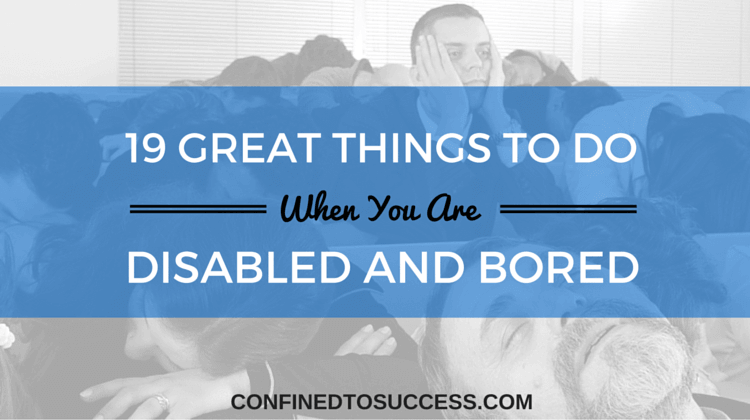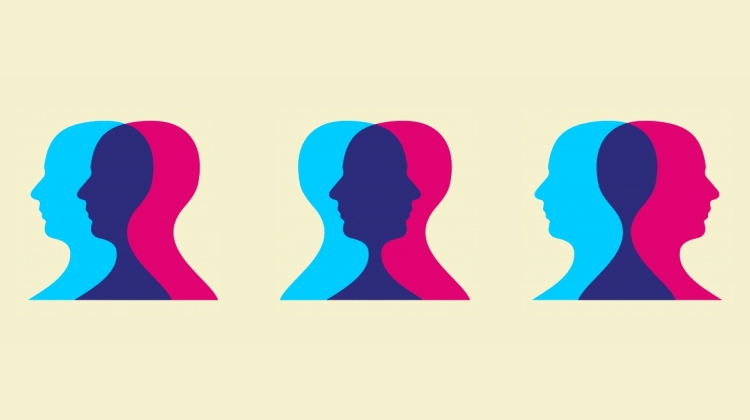19 Great Things To Do When You Are Disabled And Bored

When you’ve been super busy all your working life to suddenly having loads of free time after becoming disabled, the switch can be jarring. You may not know who you are anymore, much less know what to do with yourself. And it’s in this unfocused environment when boredom may creep in.
Boredom shouldn’t be taken lightly; it’s a negative emotion that can lead to clinical depression so it’s something that needs to be addressed as soon as it’s noticed. So what should you do when you are disabled and bored? In this blog post, I highlight 19 ways that can fill your day AND make you feel more productive.
GENERAL TIPS TO KEEP BOREDOM AT BAY
Before jumping into specific activities and hobbies, it’s worth zooming out for a moment to ask yourself whether there’s something in your life you’re doing (or not doing) to elicit the boredom you’re experiencing. Here are some suggestions to help answer that question for you.
Keep a Set Schedule
When you don’t have a schedule to stick to, it’s easy to become distracted and unproductive. For starters, make an effort to go to bed at the same time every night and get up at the same time every morning. Same goes for mealtimes, if possible.
Be Spontaneous
Sounds like I’m contradicting my last point, right? Well, not really. While keeping a set schedule is necessary, it’s also important to break up your routine from time to time. For instance, you could decorate your house or apartment to celebrate holidays and events like Halloween and the Super Bowl and buy appropriate food for the occasion.
Another idea is to do what you’d normally do at home just in a different setting like reading a magazine at your local Starbucks or Barnes & Nobles book shop.
Maintain Your Dignity
Even if no one sees you, make sure to shower/bathe and groom yourself regularly. You’ll feel much better about yourself and when you feel better about yourself, you’ll likely want to be productive in some way.
Stay Busy
Make an effort to do at least one productive activity per day. Whether that’s going out for food shopping or cleaning a room in your apartment (see #5 below), focusing your attention on a specific task helps ward off boredom.
Okay, now on to some activities…
GREAT ACTIVITIES FOR THE DISABLED
1. Get Physically Active
There’s no question that exercise of all kinds can help lift your spirits and motivate you to try other activities. Depending on the severity of your disability, Tai Chi, yoga, swimming or walking in the park are some great ways to get your blood pumping.
2. Do Volunteer Work
Volunteering is a wonderful way to cultivate empathy while staying busy. Depending on your interests, there are many places to volunteer your services including nursing homes, hospitals, animal shelters, libraries, after-school programs, political candidates and teaching English as a second language. To help connect you to the right opportunity, give Volunteer Match a try.
3. Plan a Trip
We all need something to look forward to even if it’s in the distant future and planning a trip is a fun way to do it. A couple of websites to book vacations for disabled people include DisabledGo and Accessible Journeys. Bon voyage!
4. Travel Virtually
Are you homebound due to your disability? Well, you can still “travel” virtually by watching live streams of places from around the world using services like Earthcam and Google Earth.
5. Clean a Room
While cleaning a room in your house or apartment may not exactly qualify as a “fun” activity, you’ll feel good knowing you accomplished a chore that needed to be done.
Did you notice anything missing from my list of activities? Well, if you guessed TV and/or movies, you guessed right. I purposely didn’t include TV because watching the boob tube is a passive activity that only serves to sap motivation and cause depression when watched more than two hours per day. [source] Same goes for video games.[source] That’s why it’s best to stick to productive activities and/or hobbies to fight boredom.
Let’s now look at some hobbies…
GREAT HOBBIES FOR THE DISABLED
6. Play Jigsaw Puzzles
Solving puzzles is a great way to increase concentration, expand creativity and make you more alert. Plus, it has the benefit of reducing your heart rate and blood pressure!
7. Make Crafts
There are many different arts and crafts you could pursue including scrapbooking, origami, knitting, and quilting. And if you’ve never tried to make crafts before, it’s easy to learn how through online step-by-step classes like Craftsy. To get started making crafts AND make money doing it, read this post.
8. Start Painting/Drawing
Here’s a chance to tap into an ability perhaps you never knew you had — the graphic arts! Craftsy teaches several classes on the subject which are worthwhile looking into. But if picking up a brush isn’t your thing, you can always take part in the current coloring books for adults craze!
9. Snap Photographs
Photography is a great hobby to inspire imagination and develop a keen eye to your surroundings. And if your disability restricts you from going outdoors, you can still learn to take creative photos indoors like still life and food photography. Another idea is to document your life visually with creative photos!
10. Start a Collection
Oh, there are soooo many things to collect like stamps, baseball cards, vinyl records, coins, teddy bears or even PEZ dispensers. The only caveat is that collecting can get very expensive!
11. Grow Your Own Herbs
While not a cure for boredom, there’s something satisfying about growing your own herbs to flavor your food, plus it’s a great stress reliever. [source] Most herbs like cilantro, oregano, thyme, and basil need little care so why not start with these?
12. Learn a Foreign Language
Did you know learning a language is a great way to stave off dementia and aging of the brain? Plus, you’ll become a better listener, planner, decision-maker and all around better communicator.
13. Take Up a Musical Instrument
This is my hobby of choice as I usually have an acoustic guitar nearby to pick up and play. Besides being fun, learning an instrument helps increase coordination, organizational skills and memory capacity. But most of all, playing an instrument is like a lifelong friend helping in times of need like during intense bouts of isolation (something which disabled people experience regularly).
14. Trace Your Family Tree
Would you believe genealogy is now the 2nd most popular hobby in the United States? It’s fascinating to delve deeply into your family history and make new discoveries, not to mention a great way to honor your ancestors. American families often have one or more genealogy enthusiasts in the family, maybe you’ll discover it’s you? You can check out Ancestry.com to get started.
15. Read Books
My Amazon book wishlist contains about 100 books, far bigger than my Netflix queue. I’m not sure I’ll ever catch up but that’s okay because I’ll never be left wondering what to read next. Unlike watching TV, reading makes full use of your imagination and cognitive abilities, while lowering heart rate and easing tension. Just reading 6 minutes is enough to reduce stress by as much as 68% so why not curl up to a good book? [source]
16. Register for an e-Learning Course
Just because you graduated college doesn’t mean your learning has to stop there. Keep your mind sharp by enrolling in an online distance learning class in any subject under the sun. With The Great Courses, you can sign up for courses as wide and varied as Classical Mythology, How Music & Math Relate, and Understanding Investments.
17. Build a Plastic Model
The creation of models from kits or separate components is a rewarding pastime for those who appreciate abstract thinking and fine detail. Depending on your interests, you can produce scale models, military models, architectural models, car models and many other types. A popular subreddit on Reddit.com called Modelmakers is a great place to get started with this hobby.
18. Learn Cooking and/or Baking
Why not learn to make healthy, delicious meals which your body will love you for? (or even not-so-healthy meals on occasion!) The internet is filled with online cooking classes for newbies. Just take your pick!
19. Start a Blog
I would never have started ConfinedToSuccess.com if I didn’t like blogging. It’s a great way to chronicle my life living with a disability, help people in a similar situation as me AND earn extra income while doing it!
NOW IT’S YOUR TURN!
Do you easily get bored now that you have a disability or have you always struggled with boredom? Leave your comments below!








